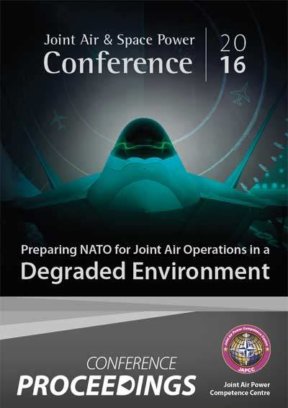Introduction
The 2016 Joint Air Power Competence Centre (JAPCC) Conference was held between 4th and 6th October in Essen, Germany. It considered whether NATO’s employment of airpower over the past two decades in operations where environmental conditions have been neither contested nor congested had resulted in a reduced level of preparedness – both doctrinally and in terms of training – for alliance air power to be utilised optimally in a degraded environment. This is a broad topic and is one that has perhaps not had the visibility it deserves in recent years. Recent operations in Iraq and Afghanistan have been conducted in environments where our adversaries, though lethal and innovative in some areas, lacked the technical sophistication to deny us the full spectrum access we need in order to successfully bring air power to bear. Put simply, modern air power is a high tech business and it is reliant upon the ability to gain unrestricted and assured access to the entire electromagnetic spectrum, space, and, increasingly, cyberspace. Environmental degradations, be they imposed by an adversary or created by natural phenomena, have a massively debilitating effect on the ability to successfully employ air power across all its roles.
In simple terms, the conference was seeking to consider whether this is an area in which NATO has potentially taken its eye off the ball. JAPCC’s intention was to open a conversation among NATO’s strategic joint air power leaders from all services, providing them with fresh ideas on actions required in this area.
These Proceedings consolidate the key note addresses, the panel discussions and attendee contributions to form a summary reference of the event and to offer points for future consideration and development. The document does not record the minutes of the Conference; rather, it highlights the major themes and draws together thoughts and ideas from all elements of the Conference. For a fuller understanding of the topic, readers are encouraged to read these Proceedings in conjunction with the previously published Conference Read Ahead material, comprised of the Conference Read Ahead, which laid out relevant background information on the broad conference themes, and the JAPCC Journal Special Conference Edition, which pulled together JAPCC Journal articles from the past which addressed this topic in some fashion. The Conference itself boasted a wide range of participants, including senior military leaders, NATO policy officials, non-governmental organisations, defence industry officials and staff from 25 different nations, all of whom contributed to the discussion on this complex and challenging area.
In the spirit of Chatham House Rules, no statements, opinions or ideas are attributed to any particular individual within this record. That being said, the JAPCC gratefully acknowledges the thoughts and effort put forth by all participants in this Conference, Keynote Speakers, Panellists, and audience participants alike.















